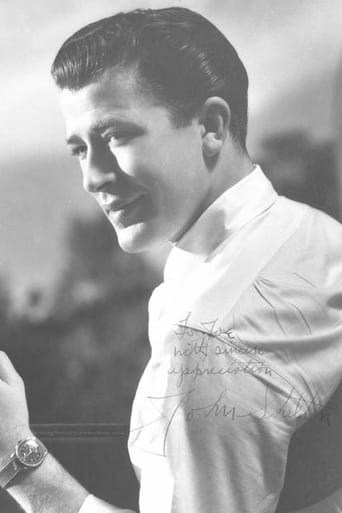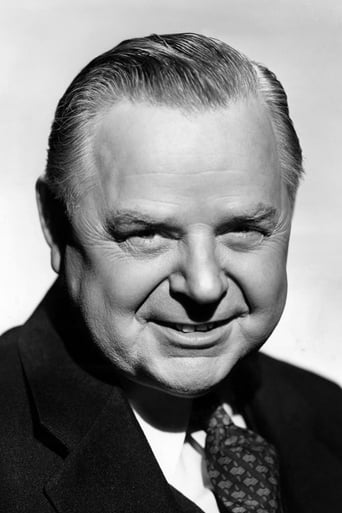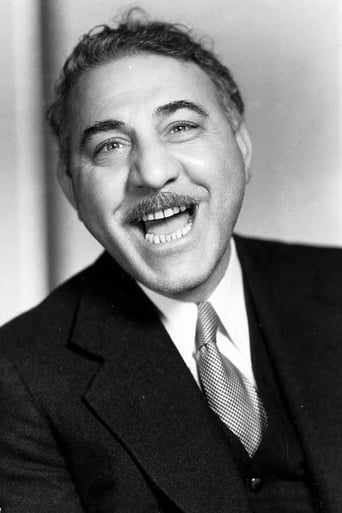Cubussoli
Very very predictable, including the post credit scene !!!
AniInterview
Sorry, this movie sucks
Rijndri
Load of rubbish!!
CrawlerChunky
In truth, there is barely enough story here to make a film.
mark.waltz
While this is a good film in its structure as a whole, it is pretty episodic in its detailing of the struggles a young married couple go through during their first years of marriage and how outsiders can help make or break a couple's happiness. The film opens with newleyweds John Shelton and Lana Turner realizing that they have just taken the most important step of their young adult lives, and after dealing with the fantasy of a one night honeymoon in a posh hotel right in the middle of their own city (New York) face the return to reality with their return to work at the same company. The day after the honeymoon is not so romantic for Turner as she is let go by hard as nails boss Gene Lockhart who objects to married couples working together, repeating the same old cliched line "A rule broken no longer is a rule" over and over, even when he has to fire Shelton later on for paycheck garnishments for unpaid furniture. The reality of Turner's pregnancy and Shelton's place on the unemployment line sets him to become angry and desperate, nearly going to jail and given a chance by given a job by a kindly stranger simply on good faith. Shelton returns to see Lockhart on brief business and tells him off for the monster he is, leading to the hard as nails boss to open up his eyes to other people's struggles considering that he allegedly has never had to go through them. While the film's mood shows the darkness of the harshness of society, it's too paint by the numbers/connect the dots in its style that the conclusions are far too obvious almost immediately. In spite of Lana Turner's top billing here, the film really belongs to John Shelton, a handsome young leading man who never became the name that Turner would be, but delivers an intense performance that shows every dimension a young person can go through as they try to make it in a world that is far beyond their control. The "Passing Parade" style narration starts off shockingly with a dead sparrow falling out of its nest onto the New York concrete, and tries to tie itself together through that "Naked City" style structuring. Turner's character seems too good to be true, perhaps the Louis B. Mayer archetype of what a perfect housewife should be, and thus she is less than memorable. It's a rare chance to see her in a not so glamorous role. While her character is pretty, she wears very little make-up, has darker hair (almost mousy brown), and her wardrobe is far from glamorous. Supporting cast members include Clarence Wilson as the stern office manager, Charles Lane as the furniture company biller who has a moment of frustration with Shelton when he pleads for understanding, and Grant Mitchell as the owner of a car which Shelton steals in a moment of desperation. The scene between Lockhart and Shelton leads to a nice breakdown for Lockhart who questions his secretary on the impact of an unseen clerk who left for a lower paying job. It reminded me of an MGM "Passing Parade" short, "The Boss Didn't Say Good Morning", which in this case, was probably true for the reasons the hero in that short had believed to be the cause. It's a nice attempt for MGM to try to do something that was more in the style of Warner Brothers, that I easily could have seen made by them starring Jeffrey Lynn and Jane Bryan.
kidboots
...Famous fighting words uttered by Bill Brooks as he and his cute wife Marjorie (Lana Turner) look over the skyline. And in this sudsy MGM melodrama it seems a forgone conclusion as battling Bill crosses swords with meanie boss Mr. Beamis (Gene Lockhart), then later on with a meanie hire purchase employer. Lana Turner goes through the movie with a "smiling through tears" look on her face - her emotions never vary as she supports Bill through thick and thin. She and Bill are secretly married, it is against company policy for staff to be married and the day they have a glorious lunch hour picking furniture for their little flat, on the installment plan - you guessed it, by the day's end Marjorie is out of a job.Hardship follows hardship - Bill takes out a loan so Marjorie can have her own doctor when the baby's due, falls behind in his payments and he, too, is fired by Mr. Beamis, who sends him on his way with an assortment of homilies about scrimping and saving and keeping your nose to the grindstone etc. Cheery Marjorie hocks her wedding ring to pay for Bill to do a chartered accounting course but still no job and, desperate, he rushes out into the night, claiming he would rather steal than go on relief. Don't let "Screenplay by Dalton Trumbo" fool you, this is just another MGM fairy story about two kids trying to make it in the big city. It was done so much better in "Bad Girl" (1931) with Sally Eilers and James Dunn making you believe in their gritty portraits of love on the dole and just as realistic, "I Promise to Pay" about the sometimes grim reality of the dreaded installment plan. Trumbo's stamp is put on it by a couple of speeches - Bill, desperate, tries to get work on a construction site and Jonathon Hale gives him a job, first telling him that he was exactly in Bill's position as a young married man, Bill, in turn, proceeds to give Mr. Beamish a tongue lashing to the effect that people should be kinder to each other!!!Of course with a lot of MGM movies of the 1940s, everything had to be patched up and tied with a nice ribbon. Mr. Beamish proves to be not such a meanie after all and the end shows Bill in the hospital, beaming at Marjorie, who has presented him with twins (she looks and sounds as though she doesn't know how it all happened - maybe the twins were a surprise edition to the script) and is now able to chose between two jobs.Lana Turner as a young destitute married girl trying to give support to her struggling husband, was one movie role that she didn't have to become accustomed to. She always looked as though she was born to wear diamonds and furs but she had first hand experience, as a child, of poverty and family instability. She was enchanted by her father's shiftless personality but it didn't make for a happy home life and one night after taking part in a crap game he was found dead in a nearby town. The poverty didn't end for Lana until she was discovered by a talent scout in an ice cream parlour after cutting class.
HarveyA
Dalton Trumbo, who wrote the script for this film, was one of the screenwriters blacklisted as a result of the Communist scare of the late 1940s and early 1950s. If you watch the movie with that in mind, you'll find fascinating the political sentiments he puts in the mouth of the protagonist (Shelton).It's not that the philosophy is Marxist, exactly, but it is certainly a left-wing view of working life. Shelton's antagonist, Bemis, expresses a very pure libertarian view--he got where he is though his own efforts alone, he never asked anyone for help, nor got help from any, and he's damn proud of it. He has contempt for "weaklings" who don't match his self-sufficiency.Shelton--Trumbo, that is--calls him out. He says that no one has ever done anything alone, he's always had help from the others around him and that people depend on each other for support and there's nothing wrong with that. Rules may be rules, but they must be administered with human kindness.We're still having the very same argument today, in almost the same words. I've found myself having identical discussions on Facebook and Reddit, and the libertarian view is alive and well. Interestingly, Trumbo makes some of the same points I have made in these discussions.Anyhow, there's a non-obvious deeper layer to this film that makes it interesting in today's political environment. It's worth seeing for that reason, if for no other.
gvb0907
This is a pretty hackneyed melodrama, obviously influenced by "The Crowd" though far inferior. Turner and Shelton play financially strapped newlyweds facing the perils of the Depression. The various crises and the final resolution are predictable and all of the characters are crude stereotypes, especially Gene Lockhart's tyrannical Mr Beamis. Shelton's performance is weak (he was dropped by MGM after this film), but Turner rises above the material and shows she's a star in the making.





